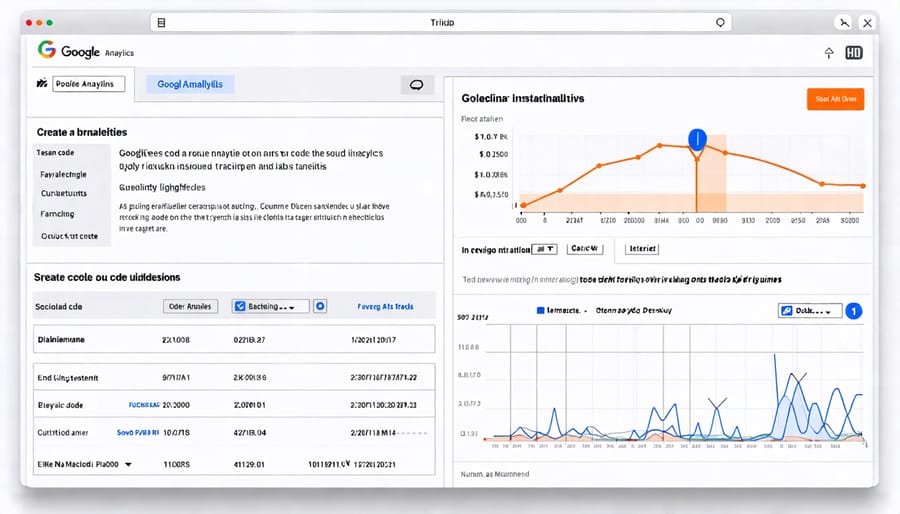Leverage Google Analytics to identify your website’s most valuable content by setting up conversion goals that highlight successful user interactions. Gain deeper insights by segmenting your audience data to understand different visitor behaviours and tailor content or offers. Enhance your site’s performance with real-time analysis by tracking live visitor activities, enabling quick adjustments to marketing strategies. Boost your online presence by integrating Google Analytics with other tools like Google Ads, allowing targeted campaigns to reach the right audience effectively.
Why Google Analytics is Essential for Small Business Growth
Incorporating Google Analytics into your digital strategy is a vital step for any small business aiming for small business growth. This powerful tool offers insights that help business owners make informed, data-driven decisions. For Canadian small businesses, understanding customer behaviour is crucial, and Google Analytics shines in offering this clarity. It provides detailed reports on who visits your website, how they found it, and what actions they take—vital data that can be used to enhance marketing strategies and optimize conversion rates.
For instance, imagine owning a boutique store in Toronto. By using Google Analytics, you can identify which products are attracting the most attention. If you notice spikes in your website traffic from a specific marketing campaign, you can double down on successful strategies, ultimately boosting your sales. Furthermore, the ability to track and analyse user demographics allows businesses to tailor their services or products to better meet the needs of their target audience.
Beyond marketing, Google Analytics provides insight into your website’s performance, highlighting any areas that might need improvement, such as page load times or mobile responsivity. These features are essential for creating a seamless customer experience, which is key to retaining customers and fostering loyalty. In a real-world example, a local bakery used data from Google Analytics to refine their online ordering process, resulting in a 30% increase in their monthly online sales.
By integrating Google Analytics, small business owners can harness the power of data without the need for an extensive technical background. This intuitive tool equips entrepreneurs with actionable insights, paving the way for smart, strategic decision-making that accelerates business growth.

Getting Started: Setting Up Google Analytics
Creating a Google Analytics Account
To get started with Google Analytics for your small business, follow these straightforward steps. First, visit the Google Analytics website and click on “Start for free.” If you don’t have a Google account, create one. Next, fill in your business information, including your website name and address. Choose a relevant industry category from the options provided to tailor your analytics experience. Once that’s set, decide on your preferred data sharing options, ensuring you understand what each selection means for your business data.
After setting up your account, you’ll need to integrate Google Analytics with your website. This step involves installing a tracking code, which Google Analytics provides. Simply copy this code and paste it into your website’s backend code. This might seem daunting, but many website builder platforms offer easy plugins to assist in this process, making it incredibly user-friendly.
Once your account is active, take time to explore the Google Analytics dashboard. Familiarize yourself with the key metrics and reports that will help you understand your audience better. The insights you gain can guide strategic decisions to boost your business’s growth. Remember, mastering Google Analytics might take time, but it’s a valuable tool for tracking progress and achieving your business goals.
Installing Tracking Code
Installing the Google Analytics tracking code on your small business website is a straightforward process that can yield insightful data on visitor behaviour. First, sign in to your Google Analytics account and navigate to the ‘Admin’ section. Here, you’ll find the ‘Tracking Info’ tab; select ‘Tracking Code.’ Copy the entire Global Site Tag (gtag.js) displayed on the screen. Next, paste this code snippet into your website’s HTML, just before the closing tag on every page you wish to track. By doing so, you’ll gain access to valuable metrics that can help tailor your business strategies for growth, based on real-time data insights.

Configuring Basic Settings
To ensure accurate data collection in Google Analytics, small business owners need to configure basic settings properly. Start by verifying your website’s URL and selecting the correct industry category, which helps tailor the data to your business niche. The time zone setting should match your local time to reflect accurate reporting periods. Enable data sharing with Google experts for insights and troubleshooting assistance. Also, set up goals, like newsletter sign-ups or sales conversions, aligning with your business objectives. Finally, exclude internal IP addresses from tracking to avoid skewed data from employee traffic. With these configurations, you’ll gain reliable insights to drive growth and success.
Understanding Analytics Reports
Audience Reports
Audience reports in Google Analytics are a vital tool for Canadian small business owners to understand who their customers are. These reports reveal important demographics such as age, gender, and geographic location, allowing you to tailor your marketing efforts more effectively. By analysing user behaviour, such as how often they visit or the devices they use, you gain insights into customer preferences and trends. This knowledge can inform decisions, from product offerings to advertising strategies, boosting engagement and sales. Leveraging audience reports can transform data into actionable insights, fostering business growth without the need for technical expertise.
Acquisition Reports
Acquisition reports in Google Analytics are essential for small business owners looking to understand where their website traffic originates. These reports reveal whether visitors are coming from organic search, social media, or paid ads, offering crucial insights for refining marketing strategies. For Canadian small businesses, learning how to navigate these reports can lead to smarter resource allocation and improved customer engagement. One local café in Vancouver used acquisition reports to shift their advertising focus, increasing their online visibility by 30%. Embrace these insights to strategically boost your business’s online presence and connect with a broader audience.
Conversion Reports
Conversion reports in Google Analytics are crucial for Canadian small business owners aiming to assess their strategy’s effectiveness. These reports reveal the journey your customers take on your website, identifying where they complete desired actions like purchases or sign-ups and where they drop off. With this data, you can refine your marketing efforts, improve website navigation, and ultimately boost your conversion rates. For instance, a local bakery discovered through conversion reports that most sales came from their online recipe ideas section. By expanding and promoting this content, they doubled their conversions in a month. Embrace conversion reports to transform insights into impactful business growth strategies.
Leveraging Google Analytics for Business Decisions
Improving Marketing Strategies
Leveraging Google Analytics can significantly enhance your marketing strategies by providing insights into your audience’s behaviours and preferences. Start by examining key metrics such as bounce rate, session duration, and conversion rates to gauge the effectiveness of your current campaigns. For instance, a Canadian boutique owner utilized these insights to tweak their social media ads, which resulted in a 30% increase in website visits and a 15% rise in sales within a month. By identifying which channels drive the most traffic, you can allocate resources more efficiently and fine-tune content to match customer interests. This data-informed approach not only boosts engagement but also optimizes your ROI by ensuring that every marketing dollar is wisely spent.

Enhancing Customer Experience
Using Google Analytics can empower Canadian small business owners to significantly enhance the customer experience by understanding customer behaviour and preferences. By analyzing visitors’ paths, you can identify which pages are performing well and which may cause users to exit your site. For instance, if a local bakery notices that product pages have high bounce rates, this insight can lead to optimizing those pages with better images or clearer calls-to-action, encouraging customers to stay longer. Moreover, segmentation in analytics helps you tailor marketing efforts more effectively, ensuring that promotions reach the most interested audiences. Tracking key metrics like session duration and conversion rates not only highlights areas for improvement but also reveals what delights your customers, leading to higher satisfaction. Ultimately, these insights offer a roadmap to refine the entire customer journey, creating experiences that build loyalty and drive growth.
Real-Life Success Stories
Small Canadian businesses across various industries have harnessed the power of Google Analytics to elevate their growth strategies. Take, for instance, Bella’s Bakery in Calgary, which leveraged insights from Google Analytics to refine their marketing efforts. By understanding customer preferences and traffic sources, Bella’s Bakery increased its online orders by 30% in just six months. This data-driven approach highlighted which products resonated most with their audience and which marketing channels yielded the best return on investment.
Similarly, a boutique fitness studio in Toronto saw transformative results. By analyzing site visitor behaviour, they discovered a significant number of users abandoned the sign-up page. They restructured their website based on these insights, leading to a 25% increase in class registrations within a quarter. Such actionable insights were invaluable in tailoring marketing campaigns to attract and retain clients, ultimately boosting their bottom line.
In Vancouver, a local eco-friendly skincare brand utilized Google Analytics to track the success of a sustainable product campaign. By monitoring social media referrals and regional interest, they successfully expanded their reach into neighbouring provinces, resulting in a 40% growth in online sales over four months. Each of these examples underscores how thoughtful analysis and application of Google Analytics can lead to substantial business wins, empowering Canadian entrepreneurs to achieve their strategic goals.
Conclusion
In conclusion, Google Analytics serves as a valuable tool for Canadian small business owners looking to enhance their business potential. By leveraging these insights, businesses can make informed decisions that drive growth and profitability. Throughout this article, we’ve highlighted practical steps and actionable advice, supplemented by Canadian success stories, showcasing the transformative power of data analytics. Embracing these digital tools might seem daunting at first, but small business owners have much to gain. We encourage you to take the plunge and unlock new growth opportunities for your business with Google Analytics.
You may also like
-
Why Brazilian Betting Platforms Want to Partner with Your Canadian Business
-
Revamp Your Small Business: Digital Transformation Success in Canada
-
Transform Your Small Business with Must-Have Automation Tools
-
Boost Team Spirit Fast: 5-Minute Activities for Busy Small Groups
-
Boost Your Business: Proven Brand Strategy Tips for Small Canadian Entrepreneurs

